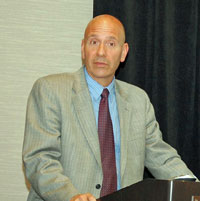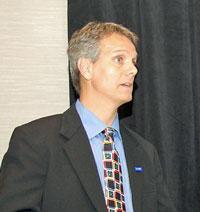Combine increasing global population and decreasing land availability with pests and diseases that like the same crops we do and you get a continued demand for crop protection tools to feed the world.
 The problem is that the public in general views pesticides as unsafe, even though they both safe and necessary, according Dr. Jeff Driver, a toxicologist with George Mason University, who spoke at the BASF Ag Media Summit on sustainability last week in Chicago. “These perceptions or biases exist,” says Dr. Driver. “What consumers need to appreciate further is the risks and benefits of having or not having pesticides, whether in their food or dealing with public health threats like Lyme disease.”
The problem is that the public in general views pesticides as unsafe, even though they both safe and necessary, according Dr. Jeff Driver, a toxicologist with George Mason University, who spoke at the BASF Ag Media Summit on sustainability last week in Chicago. “These perceptions or biases exist,” says Dr. Driver. “What consumers need to appreciate further is the risks and benefits of having or not having pesticides, whether in their food or dealing with public health threats like Lyme disease.”
He gave an example of comparing the toxicity risks of aspirin to peaches. “It’s the dose that makes the poison,” he said. “One could consume 32 aspirins of 325 mg strength and reach an acutely toxic dose. In comparison, to reach an acutely toxic dose of an example pesticide in a conventionally grown peach, one would have to consume over 1,000 peaches in one sitting, which obviously would not happen, not even in the best peach eating contest!”
Driver says that consumers have little understanding of the rigorous approval process that crop protection chemicals go through, which is even more lengthy and thorough than for a pharmaceutical product, and it is up to the scientific and agricultural community to do more to educate the public, even starting in elementary school.
Download Driver’s interview or just listen here basf-chi-driver.mp3
 Following up Dr. Driver’s presentation, BASF Product Stewardship Manager Andrew Goetz got specific about what BASF goes through to get a crop protection product registered for use and ensure that it is safe for people, animals and the environment as a whole.
Following up Dr. Driver’s presentation, BASF Product Stewardship Manager Andrew Goetz got specific about what BASF goes through to get a crop protection product registered for use and ensure that it is safe for people, animals and the environment as a whole.
“Just in the pre-development time period, we’ll do 40-50 studies and spend $2.5-4 million,” Andrew said. “We’re as highly regulated as the pharmaceutical area in toxicology. In the environmental fate area, we do more, we look at how it behaves in the environment. And in the eco-tox area we do more than pharmaceuticals. So, overall we are probably more regulated than the pharmaceutical industry.”
Listen to Andrew’s interview below.
